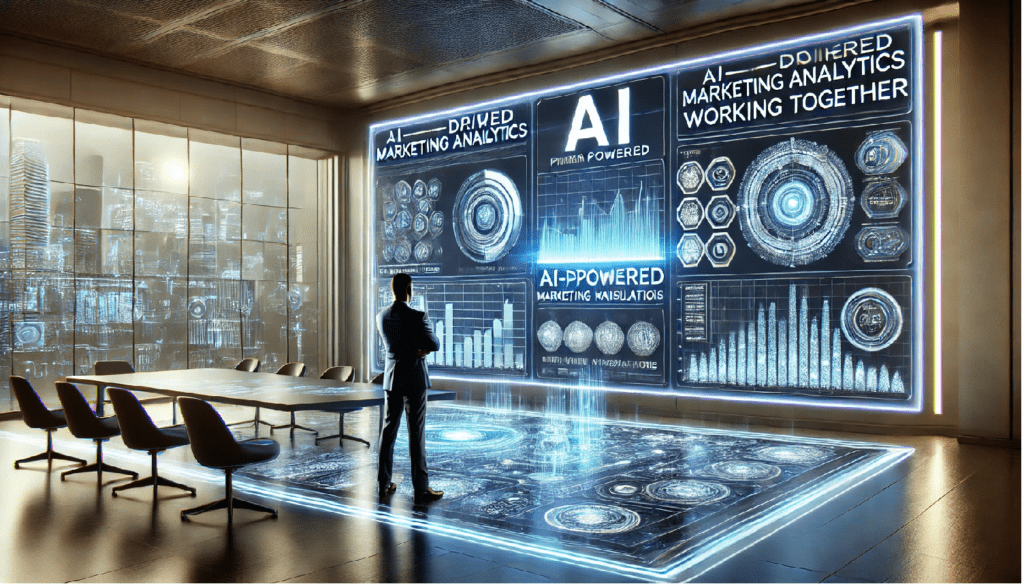Artificial intelligence is revolutionizing marketing, but AI alone isn’t enough to drive real success.
The most forward-thinking marketing leaders don’t just automate tasks. They use AI strategically to enhance human decision-making.
As a CMO or marketing leader, your role isn’t just about keeping up with AI trends.
It’s about building a framework where AI amplifies, rather than replaces, human expertise.
This post breaks down how to build a modern marketing strategy that blends AI efficiency with human judgment for better results, smarter decision-making, and long-term competitive advantage.
The Evolving Role of the AI-Enhanced CMO
The CMO’s role has changed dramatically in the last decade.
Once focused primarily on brand storytelling and creative campaigns, today’s marketing leaders must navigate:
✅ AI-powered automation in content, advertising, and data analytics
✅ Data-driven decision-making at an unprecedented scale
✅ How to balance technology with the human touch to keep messaging authentic
✅ Rapid shifts in customer behavior driven by digital transformation
To stay ahead, CMOs must go beyond tools and tactics—they need a structured approach to AI integration that keeps human oversight at the core.
The AI + Human Marketing Strategy Blueprint
A winning AI-powered marketing strategy follows a three-step approach:
Step 1: Define Where AI Creates the Most Value
AI isn’t a magic bullet—it works best when applied to specific, repeatable tasks.
The key is identifying where AI can enhance efficiency without replacing human expertise.
🔹 Great AI Use Cases:
✔ Data analysis & insights (predicting customer behavior, trend forecasting)
✔ Automating repetitive marketing tasks (email sequencing, PPC bid adjustments)
✔ AI-assisted content generation (ideation, personalization, A/B testing)
🔹 Where Humans Must Stay in Control:
✔ Brand storytelling and creative vision
✔ High-level strategy and decision-making
✔ Relationship-driven marketing (community building, partnerships)
🚀 Takeaway: The best AI-driven strategies balance automation with human oversight—not every task should be handed over to AI.
Step 2: Optimize Workflows with AI-Assisted Decision-Making
AI can process millions of data points instantly, but it still requires human context and strategic thinking to be effective.
🔹 How AI Enhances Decision-Making:
✅ Predicts which campaigns will perform best
✅ Recommends content topics based on engagement trends
✅ Identifies audience segments and personalization opportunities
🔹 How CMOs Can Guide AI-Powered Teams:
✔ Ensure AI insights align with business objectives, not just metrics
✔ Use AI tools for scenario planning, but keep humans in charge of final decisions
✔ Build or buy a framework (like HAIF) to structure AI adoption across teams
🚀 Takeaway: AI should act as a co-pilot, not the pilot—use its data insights to inform human-driven strategies.
Step 3: Future-Proof Your Marketing with an AI Framework
Most companies adopt AI in fragmented ways, leading to disconnected tools and inefficiencies.
To get AI right, CMOs need a structured framework to guide AI adoption at every level.
That’s why I developed HAIF (Human-AI Framework)—a structured approach to help businesses integrate AI without losing the human touch.
✅ Aligns AI with business goals instead of chasing trends
✅ Prevents over-automation by keeping humans in strategic roles
✅ Creates a scalable AI roadmap that evolves with marketing needs
📌 Want to integrate AI into your marketing the right way?
🔹 Buy the HAIF Guide for only $97 on Gumroad and get early access to my self-paced course on AI-powered marketing.
🔹 Need a strategy session? Book a consultation to discuss AI-driven marketing for your business.
🚀 The future of marketing belongs to CMOs who know how to blend AI with human expertise. Start building your AI-enhanced strategy today. I am here to help you, so please, use me as a resource to accelerate your progress.
Tommy Landry
Latest posts by Tommy Landry (see all)
- Black Hat AEO Is Here: Google AI Overview Manipulation Is Happening - February 24, 2026
- Where AI Introduces Risk Into Revenue Planning - February 19, 2026
- AI Is Already Influencing Your Forecasting. Do You Know Where? - February 18, 2026





